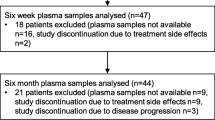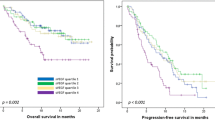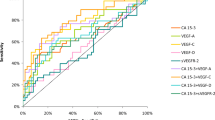Abstract
Delta-like ligand 4 (DLL4) is a ligand of the notch pathway. In tumor angiogenesis, DLL4 switches to vascular maturation by providing a negative feedback on VEGFR2 activity. We investigated the expression of DLL4 in the plasma and cancer tissues from breast cancer patients. Plasma samples were collected from 18 women with localized breast cancer, six women with benign breast disease and from six patients with widespread metastatic disease. DLL4 was assessed using ELISA and in cancer tissues using immunohistochemistry. Patients with metastatic breast cancer had significantly higher levels (median 6.7 ± 0.81 ng/ml) compared to patients with localized tumors (median 5.4 ± 0.70 ng/ml) (p = 0.005) and to patients with benign breast disease (median 4.3 ± 0.28) (p = 0.0003). High histology grade was significantly linked with higher plasma DLL4 levels (median 5.59 ± 0.62 vs. 5.12 ± 0.44 ng/ml; p = 0.01). Surgical removal of high-grade breast cancer resulted in significant reduction in DLL4 plasma levels (p = 0.003). DLL4 was expressed in tumor-associated vessels and in cancer cells. The ratio of DLL4+/CD31+ vascular density (VD) ranged from 23 to 88 % (median 49 %). High DLL4 cancer cell expression and high DLL4+ VD were significantly linked with nodal involvement (p = 0.004 and 0.01, respectively). Linear regression analysis showed a significant association of DLL4 plasma levels with the percentage of DLL4+ cancer cells (p = 0.03, r = 0.50) and with DLL4+ VD (p = 0.0007, r = 0.60). It is concluded that DLL4 is overexpressed in breast cancer cells and breast cancer vasculature and is linked with nodal and distant metastasis. DLL4 plasma levels measurement can reliably estimate the total DLL4 breast cancer/vasculature activity.



Similar content being viewed by others
References
Sivridis E, Giatromanolaki A, Koukourakis MI. The vascular network of tumours—what is it not for? J Pathol. 2003;201:173–80.
Fox SB, Generali DG, Harris AL. Breast tumour angiogenesis. Breast Cancer Res. 2007;9:216.
Koukourakis MI, Giatromanolaki A, Sivridis E, Fezoulidis I. Cancer vascularization: implications in radiotherapy? Int J Radiat Oncol Biol Phys. 2000;48:545–53.
Willett CG, Boucher Y, di Tomaso E, Duda DG, Munn LL, Tong RT, Chung DC, Sahani DV, Kalva SP, Kozin SV, Mino M, Cohen KS, Scadden DT, Hartford AC, Fischman AJ, Clark JW, Ryan DP, Zhu AX, Blaszkowsky LS, Chen HX, Shellito PC, Lauwers GY, Jain RK. Direct evidence that the VEGF-specific antibody bevacizumab has antivascular effects in human rectal cancer. Nat Med. 2004;10:145–7.
Bicknell R, Harris AL. Novel angiogenic signaling pathways and vascular targets. Annu Rev Pharmacol Toxicol. 2004;44:219–38.
Phng LK, Gerhardt H. Angiogenesis: a team effort coordinated by notch. Dev Cell. 2009;16:196–208.
Giatromanolaki A, Sivridis E, Simopoulos C, Polychronidis A, Gatter KC, Harris AL, Koukourakis MI. Differential assessment of angiogenic activity and of vascular survival ability (VSA) in breast cancer. Clin Exp Metastasis. 2002;19:673–9.
Li JL, Sainson RC, Shi W, Leek R, Harrington LS, Preusser M, Biswas S, Turley H, Heikamp E, Hainfellner JA, Harris AL. Delta-like 4 Notch ligand regulates tumor angiogenesis, improves tumor vascular function, and promotes tumor growth in vivo. Cancer Res. 2007;67:11244–53.
Costa MJ, Wu X, Cuervo H, Srinivasan R, Bechis SK, Cheang E, Marjanovic O, Gridley T, Cvetic CA, Wang RA. Notch4 is required for tumor onset and perfusion. Vasc Cell. 2013;5:7.
Patel NS, Dobbie MS, Rochester M, Steers G, Poulsom R, Le Monnier K, Cranston DW, Li JL, Harris AL. Up-regulation of endothelial delta-like 4 expression correlates with vessel maturation in bladder cancer. Clin Cancer Res. 2006;12:4836–44.
Li ZQ, Gong LL, Wen ZH, Wang J, Xu CS, Huang XD. Delta-like ligand 4 correlates with endothelial proliferation and vessel maturation in human malignant glioma. Onkologie. 2012;35:763–8.
Martinez-Zaguilan R, Seftor EA, Seftor RE, Chu YW, Gillies RJ, Hendrix MJ. Acidic pH enhances the invasive behavior of human melanoma cells. Clin Exp Metastasis. 1996;14:176–86.
Rozhin J, Sameni M, Ziegler G, Sloane BF. Pericellular pH affects distribution and secretion of cathepsin B in malignant cells. Cancer Res. 1994;54:6517–25.
Gatenby RA, Gillies RJ. Glycolysis in cancer: a potential target for therapy. Int J Biochem Cell Biol. 2007;39:1358–66.
Koukourakis MI, Giatromanolaki A, Harris AL, Sivridis E. Comparison of metabolic pathways between cancer cells and stromal cells in colorectal carcinomas: a metabolic survival role for tumor-associated stroma. Cancer Res. 2006;66:632–7.
Ding XY, Ding J, Wu K, Wen W, Liu C, Yan HX, Chen C, Wang S, Tang H, Gao CK, Guo LN, Cao D, Li Z, Feng GS, Wang HY, Xu ZF. Cross-talk between endothelial cells and tumor via delta-like ligand 4/Notch/PTEN signaling inhibits lung cancer growth. Oncogene. 2012;31:2899–906.
Jubb AM, Soilleux EJ, Turley H, Steers G, Parker A, Low I, Blades J, Li JL, Allen P, Leek R, Noguera-Troise I, Gatter KC, Thurston G, Harris AL. Expression of vascular notch ligand delta-like 4 and inflammatory markers in breast cancer. Am J Pathol. 2010;176:2019–28.
Ishigami S, Arigami T, Uenosono Y, Okumura H, Kurahara H, Uchikado Y, Setoyama T, Kita Y, Kijima Y, Nishizono Y, Nakajo A, Owaki T, Ueno S, Natsugoe S. Clinical implications of DLL4 expression in gastric cancer. J Exp Clin Cancer Res. 2013;32:46.
Zhang JX, Cai MB, Wang XP, Duan LP, Shao Q, Tong ZT, Liao DZ, Li YY, Huang MY, Zeng YX, Shao JY. Elevated DLL4 expression is correlated with VEGF and predicts poor prognosis of nasopharyngeal carcinoma. Med Oncol. 2013;30:390.
Fischer M, Yen WC, Kapoun AM, Wang M, O’Young G, Lewicki J, Gurney A, Hoey T. Anti-DLL4 inhibits growth and reduces tumor-initiating cell frequency in colorectal tumors with oncogenic KRAS mutations. Cancer Res. 2011;71:1520–5.
Harrison H, Farnie G, Howell SJ, Rock RE, Stylianou S, Brennan KR, Bundred NJ, Clarke RB. Regulation of breast cancer stem cell activity by signaling through the Notch4 receptor. Cancer Res. 2010;70:709–18.
Sharma A, Paranjape AN, Rangarajan A, Dighe RR. A monoclonal antibody against human Notch1 ligand-binding domain depletes subpopulation of putative breast cancer stem-like cells. Mol Cancer Ther. 2012;11:77–86.
Koukourakis MI, Giatromanolaki A, Sivridis E, Gatter KC, Harris AL. High DLL4 expression in tumour-associated vessels predicts for favorable radiotherapy outcome in locally advanced squamous cell head–neck cancer (HNSCC). Angiogenesis. 2013;16:343–51.
Shih IeM, Wang TL. Notch signaling, gamma-secretase inhibitors, and cancer therapy. Cancer Res. 2007;67:1879–82.
Acknowledgments
The study was financially supported by the Tumor and Angiogenesis Research Group.
Conflict of interest
The authors declare that there are no conflicts of interest.
Author information
Authors and Affiliations
Corresponding author
Additional information
For the ‘Tumor and Angiogenesis Research Group’.
Rights and permissions
About this article
Cite this article
Kontomanolis, E., Panteliadou, M., Giatromanolaki, A. et al. Delta-like ligand 4 (DLL4) in the plasma and neoplastic tissues from breast cancer patients: correlation with metastasis. Med Oncol 31, 945 (2014). https://doi.org/10.1007/s12032-014-0945-0
Received:
Accepted:
Published:
DOI: https://doi.org/10.1007/s12032-014-0945-0




